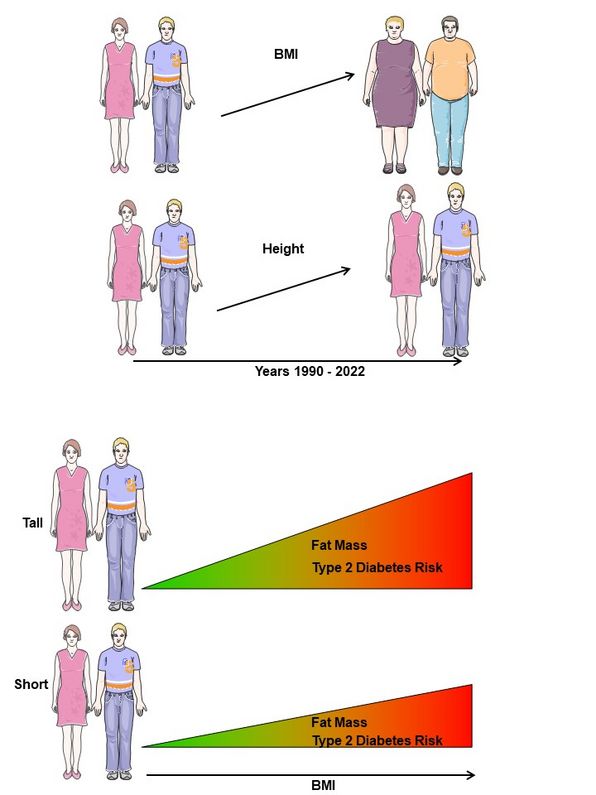If the body mass index (BMI) is the only factor used as a basis for tall people, the risk of type 2 diabetes and cardiovascular disease might be underestimated. Studies by the German Center for Diabetes Research (DZD) indicate that the fat level and the risk of type 2 diabetes are higher in larger people than in smaller people even if the increase in their BMI is the same. The results of their examinations have now been published in “The Lancet Diabetes & Endocrinology”.
Since 1990, four times more children and adolescents have become obese (as measured by the BMI) and adult obesity rates have more than doubled. This development is strongly associated with an increased risk to BMI-related diseases such as cardiovascular disease and type 2 diabetes. At the same time, people have grown taller in recent decades.
Does body height increase the meaningfulness of the BMI?
“The BMI is merely an approximation for determining the body fat level,” explains Norbert Stefan from DZD partner Helmholtz Munich and the University of Tübingen. “It is not yet known whether an increased body height changes the BMI meaningfulness as a measure of body fat level and cardiometabolic risk,” adds Matthias Schulze from the German Institute of Human Nutrition Potsdam-Rehbrücke, another DZD partner. To examine this question, the researchers analyzed the data of 972 people aged 18 years and older who took part in the Tübingen Diabetes Family Study. Their fat mass was determined using whole-body MRI. This showed that the positive correlation between BMI and accurately measured total body fat mass becomes stronger with increasing body height in both women and men. This correlation was neither influenced by age nor by the volume of the skeletal muscles of the upper and lower body. In a further analysis of data from 25,393 participants in the European Prospective Investigation into Cancer and Nutrition (EPIC)-Potsdam study, the researchers found that the risk of type 2 diabetes gradually increased with a BMI increase of 5 kg/m² from 1.58 in the lowest height category (≤150 cm) to 2.85 in the highest height category (>180 cm).
Higher type 2 diabetes risk with increased BMI: larger people more affected than smaller ones
The results suggest that the BMI better reflects fat mass and cardiometabolic risk in larger people than in smaller people. The researchers also suspect that today's adults may be exposed to a higher BMI-related health burden compared to historical populations due to their larger body size. It is therefore important to take into account the increase in body size that has occurred in recent decades in order to better estimate the burden of cardiometabolic disease due to obesity in the future.

© Norbert Stefan
Original publication:
Stefan N, Schiborn C, Machann J, Birkenfeld AL, Schulze MB. Impact of higher BMI on cardiometabolic risk: does height matter? Lancet Diabetes Endocrinol 2024. Published Online July 2, 2024, doi.org/10.1016/S2213-8587(24)00164-5

